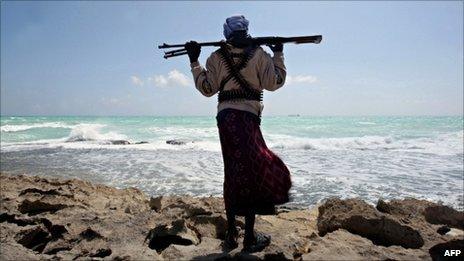The losing battle against Somali piracy
- Published

Piracy has flourished in lawless Somalia
Piracy in the Indian Ocean has taken an alarming turn recently, with the killings of two seized Filipino crewmen and the hijacking of an oil tanker with a cargo worth $200m (¬£125m). The 91»»±¨'s security correspondent Frank Gardner looks at the losing battle against piracy.
In a lengthy gun battle in the Arabian Sea last month South Korean commandos stormed a pirated ship, the Samho Jewelry, killing eight pirates, capturing five others and freeing all the crew.
The European Union naval force, Navfor, which patrols the area, is now under mounting pressure to take similar action.
Navfor's spokesman, Wing Commander Paddy O'Kennedy, said storming seized ships put the lives of hostage crew members at risk.
"At the moment our policy is that the safety of the hostages comes first," he said.
"When you use the military, people get hurt, that's a fact. The captain of the Samho Jewellery, which is the ship that you are referring to, was shot in the stomach during that action."
Mother ships
So is any real progress being made in the fight against piracy off Somalia? The statistics are not encouraging.
Currently at least 30 ships are being held, along with more than 700 hostages.
And something has changed in the last few months.
The pirates are using around eight so-called mother ships, far out to sea - large captive vessels with hostages onboard that allow them to stay in business during the violent monsoon winds.
Wing Cdr O'Kennedy says the rewards are just too tempting for Somali pirates to be deterred by a handful of international warships patrolling over 4m sq km.
"What we are dealing with here is a business model that is so good, that for a matter of tens of thousands of dollars you can put together a pirate action group, you can send it to sea and if you are lucky and hit the jackpot, you can come back with a vessel that within six months will bring you a return of nine-and-a-half million dollars.
"We are the first to admit we are not deterring piracy."
Powerful deterrent
Piracy in the Indian Ocean is getting more lucrative and more violent.
On 26 January, Somali pirates, enraged by an attempt to free their hostages, murdered two of the crew as retribution.
A third man jumped overboard and drowned. It is a powerful deterrent against warships intervening, once a ship has been captured.
A number of pirates were killed or captured when South Korean commandos seized this ship
"When you get close to ships that have been pirated they say to us 'stay away or we'll kill the hostages'. They put the crew on deck, they will put a gun against their head, and that's a pretty strong message for us to stay away."
Piracy off Somalia is a highly organised business.
There are investors, accountants and a pirate leader on land, then of course, the actual attack group that puts to sea.
I have been shown an actual pirate notebook, taken from one of the ships they seized then abandoned.
Flipping through the pages, I can see a detailed ledger, written in Somali, of provisions supplied to each pirate onboard. They all have nicknames. One is called Shino, the Chinaman, another one is called Big Nose.
Empty shelves?
Andrew Palmer, from the London-based maritime security firm Idarat, has been studying how the pirates operate.
"Each man is trained in certain aspects, they are trained in navigation, trained in the equipment they use to operate, they are given weapons training, they are told about what type of ship they are going to board, and so they are very much aware of the environment that they are operating in."
But how does this affect anyone in Britain or Europe, thousands of miles away?
On Wednesday one of the richest-ever cargos of crude oil was seized off Oman, worth $200m.
The capture of the Greek-owned Irene SL is the fourth time an oil supertanker has been pirated.
"We could very quickly be reaching a point where we're going to have to call for seafarers to refuse to sail into this area," says Mike Dickenson, from the seafarers' union Nautilus.
"Now what will that mean for the world economy? Well that means ships can't go into the area, that means we have an oil shortage again, maybe then people would take notice, maybe when the supermarket shelves start to empty, when there is no petrol in the forecourt, then people will realise how critical the shipping industry is."
Pirates have greatly expanded the areas where they operate in recent years